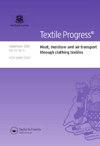Soft computing in fibrous materials engineering
IF 3.1
Q2 MATERIALS SCIENCE, TEXTILES
引用次数: 22
Abstract
Soft computing is a cluster of modelling and optimisation techniques which mimics the behaviour of biological systems. Artificial neural network (ANN), fuzzy logic (FL) and genetic algorithms (GA) are three main constituents of soft computing. In recent years, soft computing systems have been successfully used in every discipline of science, technology and engineering. Fibrous materials possess a unique combination of characteristics as they are strong, flexible and light-weight. Therefore, fibrous materials are gaining increased attention with time from the materials scientists and engineers. When fibrous materials are used for technical applications, the requirement in terms of functional properties becomes more important than the aesthetics. In certain cases, it becomes imperative to get an idea about the properties of the fibrous materials before their manufacturing. As the fibrous materials have inherent variability, estimation of their properties by mathematical models often yields a very high prediction error. Soft computing systems present the potential solutions for the modelling and optimisation of fibrous materials. This monograph presents a compendium of researches on the application of soft computing techniques in fibrous materials modelling, optimisation and engineering.纤维材料工程中的软计算
软计算是一组模拟生物系统行为的建模和优化技术。人工神经网络(ANN)、模糊逻辑(FL)和遗传算法(GA)是软计算的三个主要组成部分。近年来,软计算系统已成功地应用于科学、技术和工程的各个学科。纤维材料具有坚固、柔韧和重量轻的特点。因此,纤维材料越来越受到材料科学家和工程师的关注。当纤维材料用于技术应用时,对功能性能的要求变得比美学更重要。在某些情况下,在制造纤维材料之前,了解其性能是非常必要的。由于纤维材料具有固有的可变性,用数学模型估计其性能往往会产生非常高的预测误差。软计算系统为纤维材料的建模和优化提供了潜在的解决方案。这本专著介绍了软计算技术在纤维材料建模、优化和工程中的应用研究纲要。
本文章由计算机程序翻译,如有差异,请以英文原文为准。
求助全文
约1分钟内获得全文
求助全文

 求助内容:
求助内容: 应助结果提醒方式:
应助结果提醒方式:


